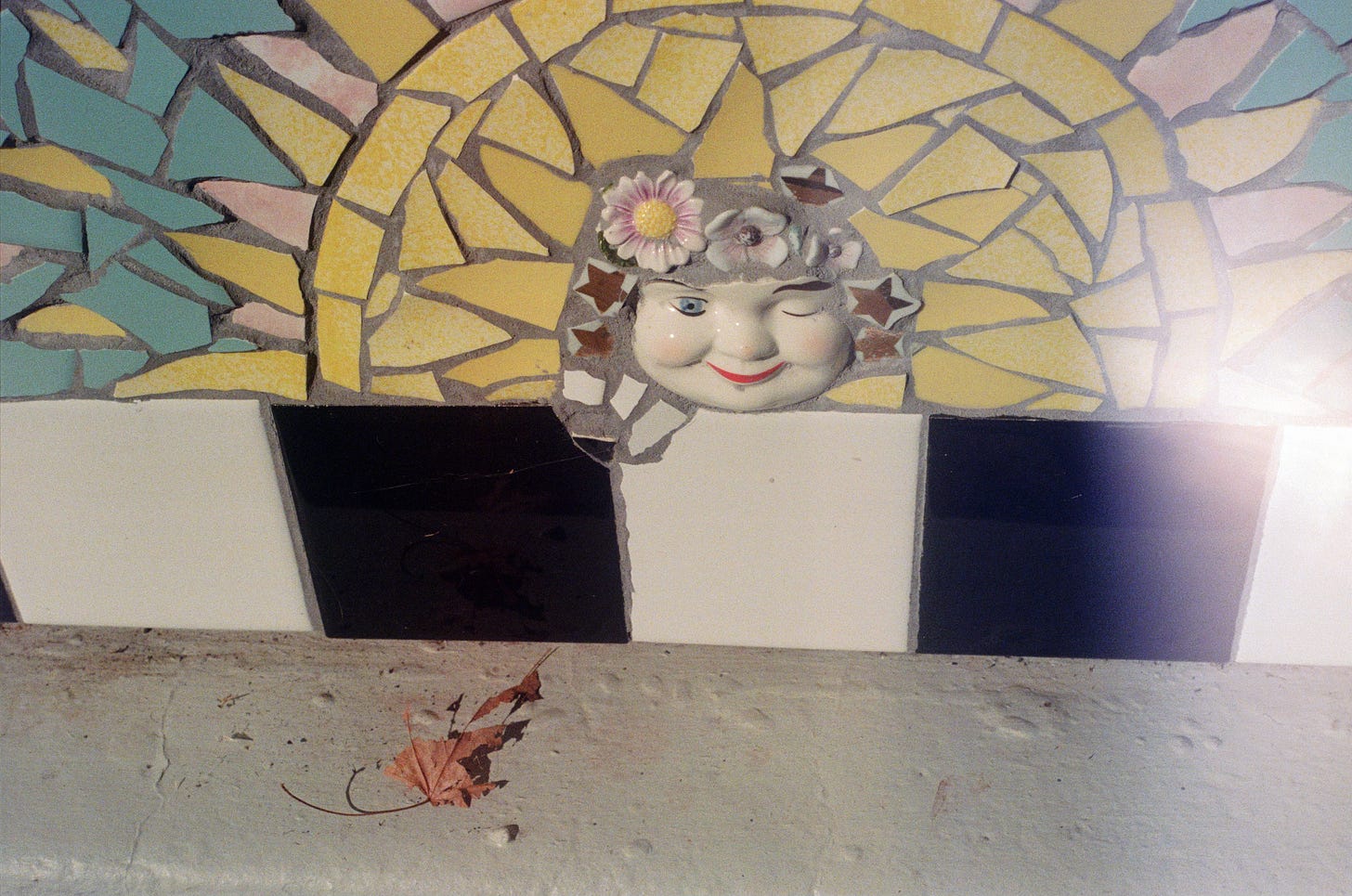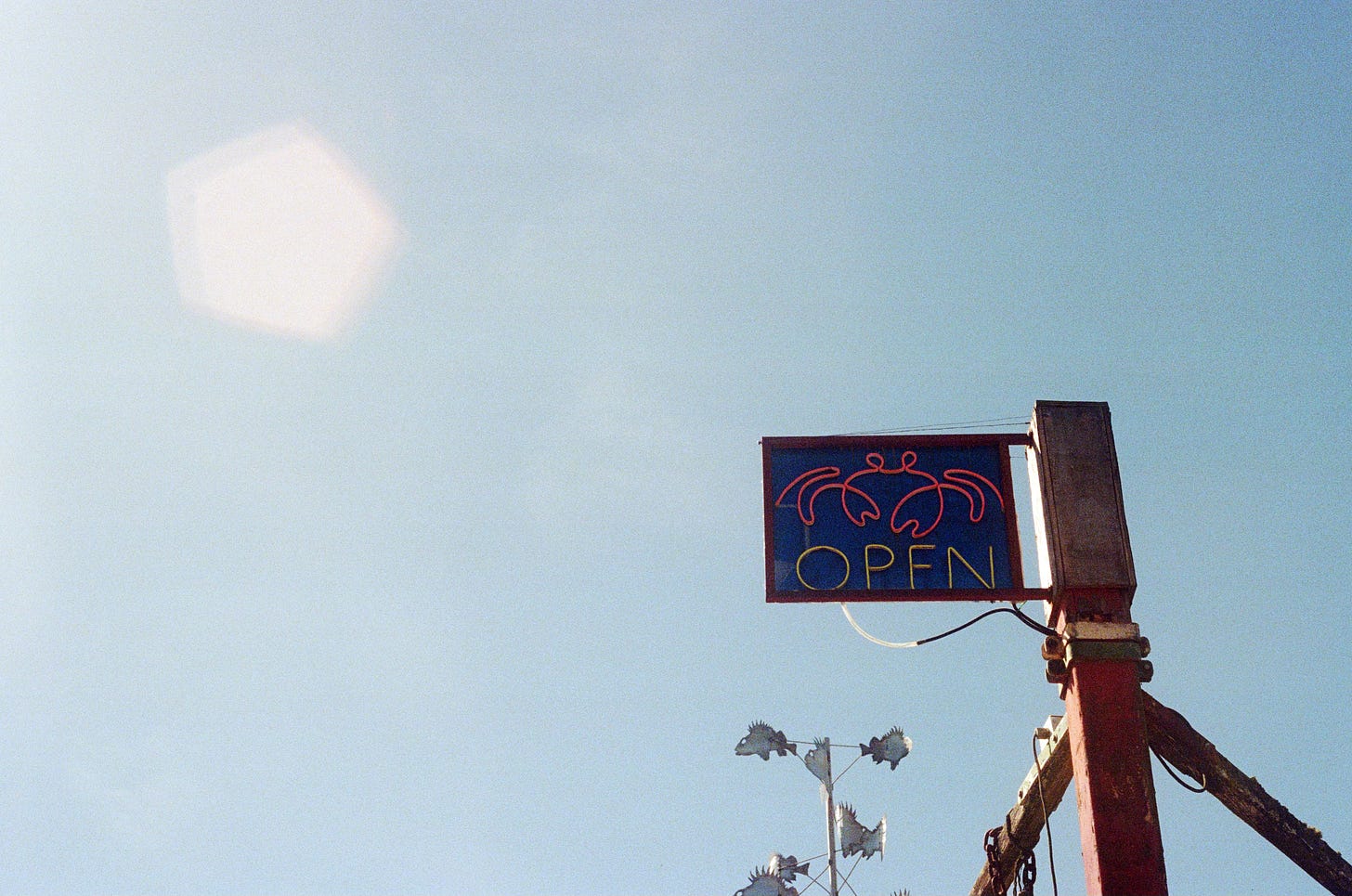For the Birds: Proactive masking
When the bulk of your masking is anticipatory, it's hard to know what you're really protecting yourself from.
Thanks for being here! In honor of Autism Acceptance Month & National Poetry Month, I’m running two raffles! Upgrade to a paid subscription in April for a chance to win an hour-long Creative Mentorship session with me. A separate raffle exists for previous paid subscribers <3 More deets here.
Paid readers of For the Birds gain access to The Resiliency Circle & receive one nourishing prompt, tool, or worksheet every month.
Near the end of winter, I had my first appointment with a Naturopath.
She is wonderful: Soft-spoken, gentle in her delivery of information—the opposite of alarmist, even when speaking about difficult things.
I probably won’t see her for much longer.
Don’t get me wrong: Her guidance feels well-rounded and driven by curiosity. She asks a lot of good questions. My body feels safe around her. A couple weeks ago, right before getting really sick again, I was fortunate enough to have my first craniosacral massage experience with her, and it was one of the most impactful healing sessions I’ve ever had.
There are little things, though. Communication things. When I ask her questions—I have so many questions, and sometimes I have to ask the same question different ways in order to really digest the information—she acts befuddled. Not antagonistic, but not affirming, either. When I express my difficulty with the character count limit in the messaging system through my patient portal, she doesn’t empathize, unable to understand my need to express certain things in writing rather than in speech.
I’ve been very upfront with her about my autistic needs, taking the advent of this safe relationship as an opportunity to practice a brand new kind of self-advocacy.
I said, my relationship with language and comprehension can be a little weird.
I said, I sometimes need to express myself in writing, not speech.
I said, I am likely going to have a lot of questions for you, and I need you to understand that they’re *not* coming from a place of suspicion or judgment.1
It’s just what my brain needs, I said.
I think she heard me, and I think she’s doing her best. Another new-to-me practice: I am not vilifying her. It is so familiar to me—so easy, even a little comforting—to put people in one of two boxes: Good or bad. Father? Bad.2 Friends? Good, until someone hurts me, and then they become Bad.
However reassuring, I do not like this pattern, and as my definition of safety evolves, I see instincts like this one as too small for my updated practices. I did not want to force this kind lovely Naturopath into one of two strict boxes. Nor did I want to beat myself up for having such instincts in the first place. I just wanted to try moving forward in a different way.
I like my Naturopath a lot. However, I’m daydreaming of a doctor who doesn’t merely tolerate my needs, but actively affirms them.
This is called raising the bar. It’s one of the more exciting consequences of unmasking.
The thing about masking is that sometimes, quite often, it’s a passive response, something that exists somewhere between the subconscious and the autonomic nervous system.
And the other thing about masking is that sometimes, quite often, it’s a choice. A thing one does to try and guarantee a certain outcome. Ease, understanding, safety.
Or rather—sometimes, quite often: The illusion of ease. Or the illusion of understanding. Or the illusion of safety.
Nothing feels quite as dangerous to my creative sensitive heart-body than to not be understood. And in the event that I sense misunderstanding of any kind or amount coming down the pike, I am faced with two choices:
I can let the situation play out as-is and risk being misunderstood—risk the need for clarification, conversation, rupture and repair. OR,
I can bend myself proactively into a shape and meaning that I’m fairly certain the other person will understand.3
Both choices are about safety, but the safety comes at different points in time, and with different consequences.
In the one, safety is responsive, in dialogue with me and my surroundings and what is or is not happening.
In the other, the safety is proactive. There’s no dialogue, just assumptions and cloaking.
All safety is not weighted the same.
A few days after my craniosacral appointment, I emailed my Naturopath. I had…questions: What exactly happened back there? How will I know if the craniosacral stuff “worked”? What should I be looking for? Why did she describe my hip movement as “chaotic”? What did she mean when she said the whole left side of my body is dense—does she mean physically or emotionally, and how does she know? The thing I am perpetually curious about, more than anything else, is how other people know what they know. What does it feel like? What happens inside you that makes you sure of something, and what does the happening feel like?
I sent her 6 emails—that’s what it took to bypass the 300 character (character, *not* word) count limitations in my patient portal—and received a phone call from her shortly thereafter. Oh, I said, That was fast. I know I sent you a lot of emails…I didn’t know how else to explain myself and get all my questions out. I bit my tongue to keep from saying, “sorry.”
Do you mind if I answer your questions now? she asked.
Well, I felt nervous but wanted to practice being honest, my partner is going to be home any minute, and we are going to go to the gym, and going to the gym is very hard and new for me—it took everything in me not to recount my recent essay about hypervigilance—and because of all this I feel a little distracted right now, so maybe we could schedule a different time to talk on the phone?
Oook, she said, wading through the surplus of information I’d just given her. We talked for another minute, mostly about talking, and then she said again, not unkindly, since I’m here now, shall we just get started? She is busy, this was not a scheduled appointment but an early evening phone call she could have just as easily not made; she was taking extra time to answer my questions, and I kept saying (oh gawd), no, I’m too distracted right now (gym, boyfriend, etc.) and also if we start and then have to stop and break this conversation up into two parts, that’s going to be really hard for me, too.
Ok, she said, fewer “o’s” this time, we’ll be in touch.
Afterwards, I was fizzing. I thought my spirit might shake and bubble right out of my body. It was lingering nervousness from the fear of upsetting another person or otherwise coming across as “difficult,” paired with the resulting nervousness of having spoken my truth—especially about a need, and especially about a need that a big giant part of my trauma brain is always always always prepared to assess with words like unnecessary, high-maintenance, or snowflake.
M came home. Post-phone call I was nonverbal, but I gathered my things, put on my gym shoes, and got myself out the door.
The revelation came shortly thereafter, me sitting in the passenger seat as we drove down Pomona, not far from our destination. The street lights were just beginning to turn on; I could still see the color of every house we drove past—brown, yellow, easter egg blue—but just barely, and soon the finer details, of yard art & outdoor decorations, would grow indiscernible. My head shifted back and forth, right to left, left to right. Left: There’s my partner, driving us to the gym. Right: there’s the houses and apartment complexes, growing dim. Left: A feeling like urgency bubbles up in chest as I look at my partner, clad in workout clothes. Right: The outline of a brand new thought is making itself visible. And then, there it was: I saw in that moment that the bulk of my adult masking is proactive.
“I love you!!” I blurted out to M with such force that he laughed and asked me what just happened.
“I don’t know” I said, feeling around for language, feeling like I’d just woken up. “I think I’m in the middle of realizing something I didn’t previously know…” Because I looked at him right when the epiphany was happening, it was like my body involuntarily burped up more truth.
I blinked a few times, shifted in my seat, and found more language:
It’s not that I’m masking because I’m finding myself in loads and loads of bad situations; for all intents and purposes, my life has been a good and safe one for some time now. Instead, I am masking because I am anticipating the worst outcome in every situation: The worst reactions from other people, the gravest, most hurtful misunderstandings, and the direst consequences (ridicule, exile).
I’m not experiencing these things, I’m expecting to experience these things.4
Which means rather than truthfully getting to see which circumstances and people do and don’t align with me these days, I’m not even letting myself find out. I’m protecting myself from all of it. I’m protecting myself from every reaction by avoiding any reaction. Do I sense the other person is about to misunderstand me? Rather than letting the difficult / messy / hard thing happen and doing the work of getting to the other side of it, I fold and bend and backtrack until we’re both comfortable again. I don’t ask, neutrally and with confidence, for greater understanding from them; I shape myself into something readily understandable. I police my tone. I overexplain. I nod emphatically, regardless of confusion. I’m not just wearing a mask; I’m covering my entire body with masking tape, sealing myself up in anticipation of any amount of hardship. Which means my impression of what’s hard and what isn’t, who supports me and who doesn’t, isn’t an accurate one.
When am I safe? When am I not safe? By opting for strict hypervigilant parameters, the truthful answer is: I’m not sure.
That’s a really hard thing to not be sure about, because it means my own intense and prolonged protective strategies have actually made it harder to know, with any veracity (let alone intuition), when and where I actually need protection.
Raising the bar for oneself is a messy, confusing process, and it doesn’t feel good at every point along the way, which is doubly confusing. Instead, it feels good and then scary and then like a mistake and then empowering and then too much, too much! and then angering and then something else altogether, tipping back and forth and sideways into so many different emotional quadrants that measuring real progress can feel utterly impossible.
But slowing down long enough to notice these things in real time is vital, because noticing our real selves in real time is how we enact personhood. When I practiced self-advocating to my Naturopath by phone, I was terrified. But I reached, with all the attention I could muster, back toward my body, back toward what I knew I wanted to say, back toward what felt, on some quieter level, true. It’s not that I didn’t start to dissociate, it’s that I made the choice to reach back anyway; afterwards, buzzing, I sat with the sensation rather than rushing away from it, noticing the disjuncture between how I felt (in a word: bad) and what I’d nevertheless just accomplished.
Truthfully, I beat myself up a lot when I catch myself fawning and masking, in part because they’re stark reminders that I am still not in control of my self. Yet I am desperate to cultivate a different way of relating to these internal mechanisms—as
recently and beautifully put it, to not be so gawd damn loyal to correcting myself all the time; to remember that I am an animal, that I protected myself, and that it worked.At the same time, as I round the bend of learning about my autism and launch into the next phase of integration, I sense a leveling up on the horizon. One where the dichotomy between masked ←→ unmasked carries a little more nuance, a little more choice, and a lot more acceptance. One where my aim is not to be unmasked 24/7, fist-in-the-air style, but to make thoughtful choices about which mask I’m wearing, and when, and why. To see “unmasked” as less of a concrete state and more of a fluid practice.
My hunch is that such leveling up will also help my relationship to protecting myself grow more defined and increasingly accurate. Because truthfully, I don’t want to protect myself from the idea of harm, only real harm. And I don’t want to protect myself from the small, hard situations that bring discomfort and misunderstanding but also repair and resilience. And I want protecting my needs to be an action that brings me closer to them, not one that keeps them far away and locked up. I want protection to mean I get to experience the experience.
It’s only possible for me to say such things from a place of safety, and it’s taken years, along with the collaborative efforts of so many different kinds of healing modalities, creative pursuits, and helping professionals, for me to be able to write this sentence, let alone mean it.
I want the next step, then, to be a tangible one. I want to raise the bar in what I expect for myself, especially when it comes to receiving care and support. I want to practice being less proactively masked and more authentically boundaried.5 And in doing so, I want to focus in on the real textures and curves and details of my needs. I want this for you, too.
The risk of uncomfortable conversations and hurt feelings is nothing compared to the potential reward: A clearer, more confident understanding of what serves me well, and how I care for myself in the face of something that doesn’t.
I’m grateful to my Naturopath for these illuminating experiences, this safe relationship that allowed me the opportunity to practice a different way of being. I couldn’t have thought my way here in a less supportive interaction; and, oddly, I may not have learned about these nuances in a more supportive one.
I now know that my instinct was right: I want a doctor whose purview is broader and deeper than western medicine allows for. I want a doctor who is kind and compassionate, whose brilliant intellect comes wrapped in soft-spoken packaging.
And I want a doctor—a coach, a therapist, friends, my partner, literally anyone in my life—who is as curious about me as I am about them. Someone who doesn’t just quietly permit my needs, but folds them enthusiastically into our plan of care.
Someone, in other words, who will meet me where I am at. Not because they’re trying to accommodate me (which is also great), but because they recognize that where I’m at is a good and valuable place to be.
The medical ego seems particularly offended by too many questions, which is so flabbergasting to me that I can’t help but laugh. One time, when I was still in a social work position at a community mental health agency, I asked our on-site doctor a few questions about our COVID protocols. That afternoon, I was called into my supervisor’s office. The doctor had informed her about my “inappropriate” and “deeply disrespectful” behavior. He thought I was calling his practices into question, when in reality I just didn’t understand our protocols and really wanted to. He walked away with a bruised ego nevertheless intact, and continued wreaking havoc with co-workers and clients alike; I walked away with my mask once again reinforced and yet another reason to consider staying quiet more often.
Some things are black and white.
35 years of masked, undiagnosed autism = I’m really good at making myself understandable.
Obviously, I have experienced these things—hence the ingrained instinct.
To paraphrase some recent words from Dr.
, boundaries are less about enacting exclusion and more about creating clear containers of safety [*mind blown*].










I relate so deeply to the erasing of self through anticipatory thinking and masking. ♥️
Speaking to practitioners is always so difficult and asking to be seen as a full agentic person, rather than a list of symptoms and “problems to fix” is no small feat. Safer, caring relationships, like those you have found, are so precious.
Being able to see masking as a fluid practice is so new to me. This is such helpful and nuanced framing.
Thanks for sharing as always!!
I literally needed to read this right now. It resonated in a way that made so much sense to me.
And then, directly after I read it, I received a message from my real estate agent…and instead of masking I told her what I was dealing with emotionally and why my response was abrupt and reactive.
She was so kind and gentle, and has known I’m autistic from the get go. She has not just accommodated me but met me where I’m at.
Thank you for reminding me that being open and unmasked will help me find the people who will work with me, and not accidentally with a different masked version of me because I can’t trust them.
This past year and a half of uncamouflaging has been hard. But so worth it. And reading your words and your experiences has been so very illuminating.
Thank you. 💖